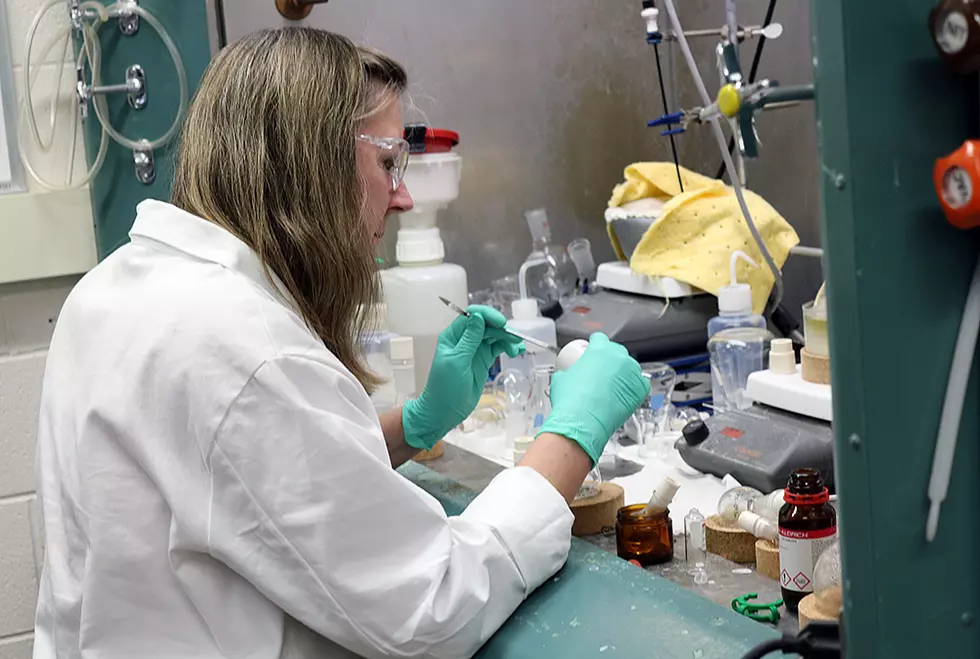
Rocky Mountain Bio aids pandemic testing, helps grow Missoula’s bio sector
A call for serum from a Missoula hospital at the height of the pandemic sent Rocky Mountain Biologicals racing to fill the request.
Now, the material has entered the global market, adding another notch to Missoula's growing cluster of bio-based companies.
“We have been extremely busy lately,” said Jeff Pease, the chief business development officer at RMBIO. “Some of the things that have come our way, especially dealing with COVID-19, is something we never imagined we'd get in to, because it's not our core business at all to be dealing with viruses like that.”
Pease recently joined a handful of other executives from across the state to discuss their international trade portfolio with the Montana World Trade Center.
Founded in 2004, RMBIO produces the proteins and serums needed to test cell cultures for a number of applications, including pharmaceuticals and diagnosing. It sources the materials to both national and international clients.
“Our normal product line is this serum, or the media used for these specific cell lines that these companies use to create vaccines,” said Pease. “They'll take our serum or media and use it to grow different cells and see how well it grows with their particular cell line that they're creating a vaccine for.”
The company ramped up its efforts in March when it received a call from Community Medical Center in Missoula, which was looking for a viral transport medium. The material is needed to submerge the nasal application and preserve the sample for testing.
But with testing for COVID-19 on the rise, the industry was facing a bottleneck and the media was in short supply. RMBIO received the recipe from the CDC and the Mayo Clinic and reviewed it with its in-house scientists, who agreed they could make it.
“We went ahead and ordered the products in so we could hit it as fast and as hard as possible,” said Pease. “We wanted to do what we could, first in Missoula then Montana and the surrounding states.”
Within a month of production, RMBIO was shipping the medium to hospitals around Montana. Now, Pease said, the material is heading to other countries.
“I'm in contact at least twice a week with countries I've dealt with before in the serum business,” Pease said. “We are going global with this product as well. It's been an incredible opportunity for us. It's kept our employees nice and busy.”
RMBIO is an active member of the Missoula Vaccine Partnership, and it continues to play a role in transforming western Montana's economy.
In recent years, a number of biotech firms have emerged on the scene including Innumune, DermaXon and Expesicor. Many interact with the Center for Translational Medicine at the University of Montana, which also conducts vaccine research.
“Bioscience is significant and growing in Montana,” said Brigitta Miranda-Freer, executive director of the Montana World Trade Center. “Major pharma is expanding in our state. We have several smaller, agile bioscience firms that are playing essential roles in combating COVID-19, from supply change solutions to vaccine development.”
UM President Seth Bodnar offered a similar view last month while showcasing the university's vaccine research program and its efforts for a coronavirus cure. The opportunity to build on Missoula's burgeoning bioscience cluster shows potential, he said, and it's poised for future growth.
“You've seen some amazing grains of sand come together and form a pretty nice pearl,” Bodnar said. “You're starting to see the potential to build a really big biotech cluster right here. If we get the right type of investment – the venture capital and the incubation space – you could see much more than a biotech cluster right here in Missoula.”
RMBIO has played a hand in leading that growth, and it's seeing growth of its own – much of it driven by reputation. The firm was recently purchased by Welgene Inc, a South Korean company that specializes in manufacturing cell cultures and liquid agents.
Pease said the union has opened new opportunities.
“Welgene has an incredible group of world class scientists who can now take our product and tie that in with multiple different cell lines,” said Pease. “Once you get that reputation then the bigger companies, the big pharma companies, will actually share their cell line with you as a company.
“Our scientists can start working specifically for those to improve the media for that cell growth. That's our ultimate goal, to continue doing what we're doing, but to have these pharma companies coming to Montana and using our scientists on site.”
